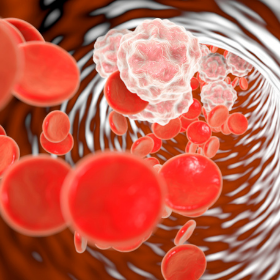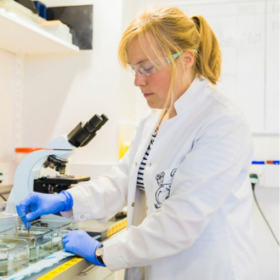Hello. This is awkward. I wasn’t entirely sure how to start and have genuinely just googled ‘funny ways to start a blog post’ and realised post-hoc that means I am inherently not that funny. I was momentarily torn by the one suggesting using the quirky ‘what’s my name, b**ch’ approach but then my eye was caught by the one that said ‘lead with a success story’. To which my instant reaction was…no. So that’s my title.
But, I will use this one to introduce myself and try and tell you a little bit about why I’m here and what I’m trying to achieve and hopefully a little bit about the journey I’m going to try and take with these posts.
I recently volunteered for an early careers podcast roundup in the interests of professional development and outreach and was absolutely horrified to be the oldest person there. Surrounded by exuberant PhD students I sat, asking old person questions about mentorship and feeling very jaded. So I enquired of my peers as to what they thought an early career researcher was and my new favourite definition came from my lab mate, Paul, who said ‘basically until it says professor on your door I think you’re an early career researcher’.
So here I am, an early career researcher in neuroinflammation, feeling like my PhD from 2013 was a long time ago.
I started my science journey at around the age of 11. Both my parents have wonderfully enquiring minds and whilst they’re not researchers they both thoroughly enjoyed the Royal Institute Christmas lectures which were on every year in our house. I watched Susan Greenfield, now a Baroness, talk about brains and was hooked. ‘I want a job where I have a brain in a jar’ was basically my career motivation from then on.

Cascades and pathways are fascinating. Cytokines and chemokines are amazing and fun (well Yvonne things so)
I did an undergrad degree in Neuroscience at Manchester and at a tutorial in my first year I indicated that I thought I might like a career in research. I was encouraged to switch to the 4 year programme which included a year in industry. For this I was to go to the neuroscience department at Boehringer Ingelheim in southern Germany, but at last minute my placement supervisor got moved and I was shifted into pulmonary research onto a project on inflammation.
‘Inflammation?? Eurgh. I know nothing about inflammation’
But after a month or so I was hooked. Cascades and pathways became fascinating to me, cytokines and chemokines were amazing and fun and complicated. I had a slightly removed boss though and was getting very little supervision so I ended up calling our course supervisor back at Manchester and asking for what I now know is some of the best advice I’ve ever received.
‘Erm….nobody is really telling me what I should do’
‘What do you think you should do?’ Replied Liz, the tutor.
A lightbulb moment occurred. I started telling her about signalling pathways and how things might be tested using specific types of calcium imaging after knockdown.
‘Can you use the machine, or get someone to help you?’ She asked.
Then I was off. This was the moment. I could have an idea and test it. What a revelation!
From Boehringer I decided I needed to combine my dream of the brain in the jar with my new interest in inflammation and sent what is, in retrospect, one of my more embarrassing emails. I asked Stuart Allan, renowned neuroinflammation researcher, whether there was a way of combining my interest in inflammation with my interest in neuroscience. You can imagine the response. But he very kindly offered me a spot in his lab for my final year project and so I arranged lecture modules so I had a full five months of lab time and it was wonderful.
During this time I made another of my persistent early scientific memories. A PhD student in the lab who’s name I sadly forget came into the lab bearing a tray. She was always very smartly turned out and that day happened to be wearing a lovely skirt and some heels but on the tray were an array of freshly dissected rat spinal cords. She started removing pumps from them and mused the following out loud: ‘You know what my favourite thing about this job is? Every day I’m doing something entirely different’. Another revelation for the junior scientist in me.
After Manchester I sought PhD places but was unsuccessful. I moved to Oxford with my wonderful partner David and whilst he undertook his PhD I started working as a research assistant on a GlaxoSmith Kline funded project at the University. Once again I found myself adrift on a project that seemed to be funded but unsupervised by the company so I started doing experiments that I was interested in which would, eventually, lead to my first paper.
I was offered a place to study for an MSc in Pharmacology, a wonderful course which gave me many of the small animal surgery skills I have acquired over the years. I managed to get a distinction somehow and got into a PhD programme in the same department where the plan was to work under three supervisors to study inflammation and its role in disruption of the serotonergic system. I sold this to lay friends and my parents as follows – ‘you know when you get sick and you feel miserable? I’m trying to figure out why’.
I genuinely loved my PhD. Yes there were ups and downs. I spent a whole summer trying to get some western blots to work which never went anywhere. I had a memorable moment when I handed a report in an my supervisor sarcastically asked me whether I knew what a paragraph was, almost driving me to tears. But I grew so much and loved every minute of it.
For my first post-doc I did a stint at the University of Southern Denmark, carrying on with my interest in inflammation and the brain but finding a major disease focus – stroke. Working in a different country, especially where the native language isn’t the same as yours, can be a lot of fun. Sadly my contract was only for a year so I sought out a post when I returned which would allow me to continue to focus on stroke. I found the lab of Alastair Buchan, at the time head of medical sciences at Oxford, who happened to have a post-doc position available. I moved in and basically haven’t left.

Oxford has housed students since 1096. Despite feeling like the oldest ECR in town, Dr Couch hasn’t been there quite that long.
Working for someone who is very removed from the fundamental comings and goings of a lab gives you a lot of freedom and this is what I discovered a year out of my PhD in the lab I had settled on. I could pick up spare and lost PhD students, I could tinker with small projects that interested me. But at the same time I had to pick up a lot of sudden responsibilities which I was still slightly unprepared for. If I wanted to tinker I needed money so I had to write grants. If I wanted to do animal work I needed to write home office reports and maintain a project licence. Administrative duties suddenly came calling but didn’t put me off what I was doing, I still loved research.
So after a couple of years of very small grants and popping out some papers I decided I really needed to make what I was doing my own. I love extracellular vesicles, don’t worry there’s another post on them coming, and so I focussed on getting a fellowship to study them. Writing a fellowship is no mean feat. The whole process took me around 6 months, with revisions and drafts, learning to use the online system, learning how to workout finances but then I had a draft which could be tweaked and submitted elsewhere if it wasn’t successful. Which it wasn’t.
It went to the Wellcome, who said no thank you please don’t come back. It went to the MRC, who said no thank you but maybe fix a few things and try again. So it got tweaked and then it went to the MRC again, then the BHF and ARUK, all with slightly different angles. The MRC said yes, please come for an interview, then they said no we don’t believe you can do all of this. They managed to say that in the same week the BHF said no but maybe fix a few things and try again. At this point I had had enough. I was fed up. I wasn’t working I was just writing and getting rejected. So I paused and in that pause Alzheimer’s Research UK said yes please, tell us how you’d respond to these comments. Followed shortly after by yes, please come for an interview.
Somehow I managed to convince them I was an acceptable scientist so here I am, 6 months into an Alzheimer’s Research UK fellowship with very few results and still panicking as much as I did before I got one.
Apologies this was a little long. I hope you’ve not gotten bored by this point because this feels very self indulgent. As one of the ‘older’ (lets go with more experienced) researchers here I’m going to try and give you some insights into my science, as well as my attitude towards some of the other aspects of research culture. I can’t promise not to whinge on occasion but I can promise that you might learn something you didn’t know before. So stick around and lets see where this goes.
Author

Dr Yvonne Couch
Dr Yvonne Couch [1] is an Alzheimer’s Research UK Fellow at the University of Oxford. Yvonne studies the role of extracellular vesicles and their role in changing the function of the vasculature after stroke, aiming to discover why the prevalence of dementia after stroke is three times higher than the average. It is her passion for problem solving and love of science that drives her, in advancing our knowledge of disease. Yvonne has joined the team of staff bloggers at Dementia Researcher, and will be writing about her work and life as she takes a new road into independent research.